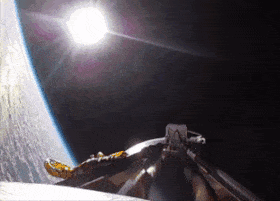The American company Astra Space launched the Rocket 3.2 rocket for the third time, but again faced failure. The rocket first went into space and reached a maximum altitude of 390 kilometers, but it did not have enough speed to reach a stable orbit due to incorrect selection of the fuel mixture. During the next launch, the company will not modify the rocket itself (only the fuel composition), and will install a payload on it for the first time.
Astra Space is an American startup developing a light orbital rocket for small cargo launches. It has a classic two-stage design with kerosene-oxygen liquid engines on both stages. According to calculations, the rocket is capable of carrying a cargo weighing 150 kilograms into an orbit with a height of 500 kilometers. Due to its small size, the rocket is placed in a standard 40-foot ISO container, which is widely used in cargo transportation. It was in this form that specialists brought the rocket to the launch pad at the Kodiak cosmodrome, located in Alaska.
in 2018, the company twice successfully conducted suborbital tests of the preliminary version of the rocket, and in march 2018 began to launch the rocket into orbit, but all three times faced problems. In March, the launch of the DARPA competition was canceled due to problems with the navigation and control module, in September the rocket managed to launch, but after 30 seconds the engines turned off and it fell.
During the new launch on December 15 at 23: 55 Moscow time, the rocket, as in previous times, did not carry a payload, and the purpose of the tests was to test the very possibility of flying into orbit. Initially, the flight took place normally and the first stage worked properly, after which the second stage separated and continued the flight. However, at the end of operation, the second-stage engine finished 12-15 seconds ahead of schedule. This led to the fact that the rocket gained a speed of 7.2 kilometers per second — 0.5 kilometers per second less than necessary to enter a stable orbit. The maximum flight altitude was 390 kilometers.
After the launch, representatives of the company said that the reason for the failure (the company itself calls the flight successful, despite the fact that it initially assumed that the rocket would enter orbit) was the incorrect composition of the fuel mixture. The company plans to launch the next rocket in a few months, and it is not going to make any design or program changes to it. Also during this flight, the rocket will attempt to launch a payload into space for the first time.
The main competitor of Astra Space in the field of light launch vehicles is the American Rocket Lab, which developed the Electron rocket. It has a large payload mass (up to 300 kilograms), and has also made 17 flights (two of them were unsuccessful). It recently returned the first stage of a rocket after launch for the first time, parachuting it into the sea. In the future, she plans to intercept the descending stage by helicopter before it lands.
Gregory Copies

